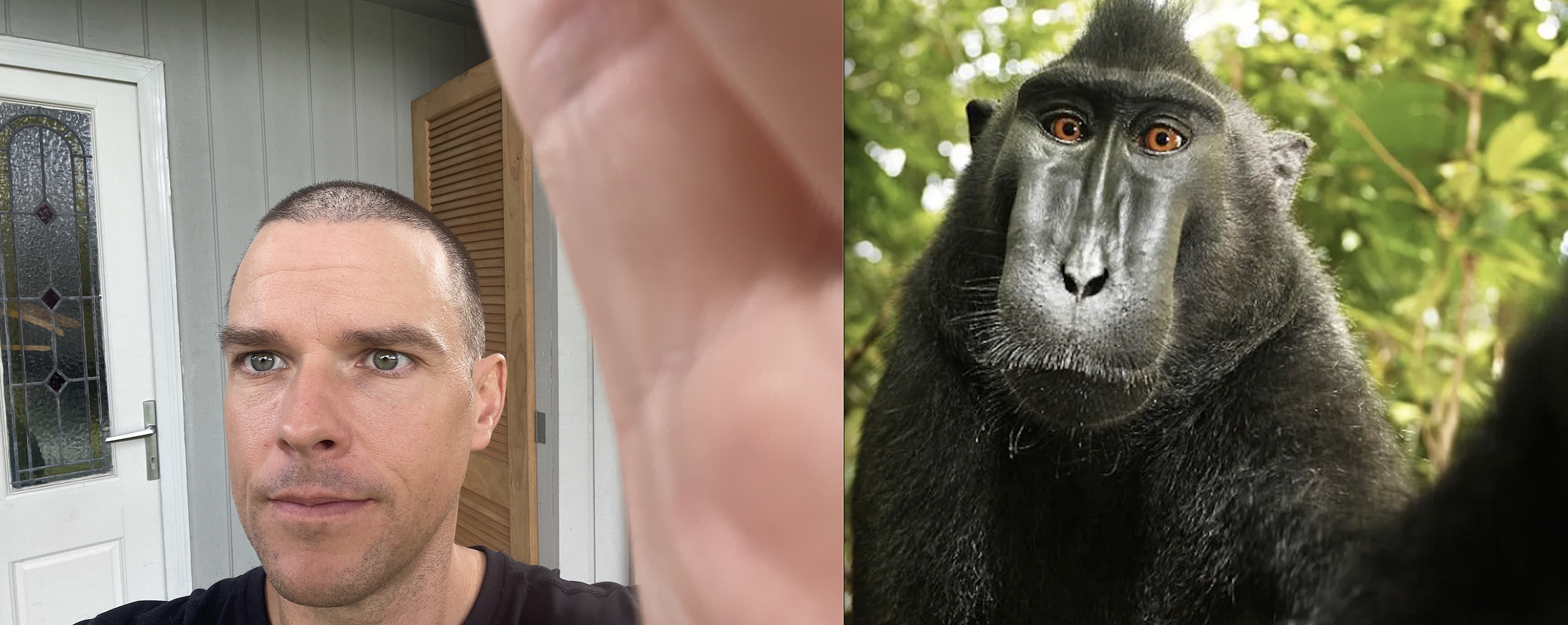
Photo on left is of/by Mattanaw©™, the author. Photo on left is by Naruto, using a camera owned by David Slater. Both are Primates.
Humans are Animals
Draft Created: Saturday, February 11th, 2023, at 4:07 PM Waitara, NZ Time
Contents
Author
Author: Dr.9 Mattanaw, Christopher Matthew Cavanaugh, Retired
Interdisciplinarian with Immeasurable Intelligence. Lifetime Member of the High Intelligence Community.6
- Masters Business & Economics, Harvard University (In Progress)
- Attorney, Pro Se, Litigation, Trial, Depositions, Contracts (E.g. State of Alaska v. Pugh, et. al., Alaska Superior and Supreme Courts)4
- B.S. Psychology, University of Maryland, 4.0, Summa Cum Laude1
- B.S. Computer & Information Science, University of Maryland, 3.91, Magna Cum Laude2
- B.A. Philosophy, University of Maryland.3
- G.E.D., State of Maryland, Montgomery County, 1999.
Former Chief Architect, Adobe Systems
Current President/Advisor, Social Architects and Economists International.
Contact:
Resumé
Edit History
- Draft Created: Saturday, February 11th, 2023, at 4:07 PM Waitara, NZ Time
Introduction
In my twenties, as I was arguing various aspects of my early moral philosophy and ethic, I encountered again and again a resistance to comprehension, and obstacles to developing conversation, relating to commitments people had regarding the non-animality of people. Once conversation approached naturalism in moral perspective, religious friends would raise objections indicating they really did not understand yet that humans really are animals. For this reason, unfortunately, many conversations were had that did not leave a starting point in communicating my perspective. The result is that there are friends and family members who didn’t even start to hear what my growing philosophy was. Since so much time and effort was going into my writing and plans regarding my moral system, it was unfortunate to discover that without introduction to preliminary information, they would not go further to understand my efforts and mind. Knowing that their questions and confusions regarding basics were not going to be common, I knew that I would need to provide initial readings which would enable understanding of the main material that I was wanting to communicate.
That people did not really commit to the view that humans were really animals was something I noticed was hidden from the surface of everyday conversation. One would think on exposure to biology in school, that all would recognize that people are animals, and have Earthly relationships to other animals that are in their environments. However, Darwinism and Evolutionary theory has not been adopted widely, and most have not read about it directly. Only a subset of the population have committed to an evolutionary perspective, and only some people who have not been adequately exposed immediately agree that humans really are animals. Some cultures are more willing to accept that they are animals than others. Those who are religious oftentimes object not only to Darwinism and Evolutionary Theory, but biological sciences more generally in their adoption of superstitions which conflict with the view that humans really are animals. For example, many people do avow a belief in an afterlife, and the ceremonies related to death and burial still pervasively assume that there is a life after death. This view that there is a life after death is still held to be exclusive to humans; animals are not often considered to be among those that have an afterlife. Of course, none do, but this desire to have a soul, have an afterlife, and have various superstitious properties prevents some from being able to take the leap to fully accept that they are really animals who do not really have any supernatural traits. All are natural, but there is also considerable social pressure to keep religions alive, and in doing this, people are encouraged to stay unscientific in their worldviews.
Additionally there is an issue in that animals are still consumed for food, and are farmed and harvested in a way that is not very attentive, overall, in most cases, to theanimals well-being. Humans generally do not want to know about how animal agriculture is really done in all its details, although most are aware, that it is gruesome, and often torturous. There is also the view, that animals in nature, are for free use. That businesses can simply take from water and from land whatever animal happens to come from a legal space of access. This encourages people to use animals as free units or products to earn incomes. The cooperation of animal agriculturalists, and those who harvest from nature to produce from themselves and others, and people who simply buy food at groceries and restaurants not wanting to know more, encourages a strong separation between people and animals, so there is no guilty thinking or remorse or sadness about what is being done. The author does not think that hunters and farmers are not uncaring about animals in all or even most instances; instead, the author thinks that farmers and hunters, and meat eaters don’t want to think their lives include activities that extended for very long periods of time, that were extremely harmful. This would lead them to the conclusion, that maybe they have been “bad” so long, that they really cannot be “good people”, and are really immoral. In order to avoid this conflicted way of thinking, knowing that one can do good things in many contexts, but then overlook animals entirely because of the way the market functions with unseen preparation, which is called in psychology “cognitive dissonance”, which amounts to “this thinking feels unharmonious because of contradiction”, people try to take an easy path to get out of the thought. This means that instead of making changes, most people really spend their time thinking of other things, and prefer the topic not to be raised, so they can continue to think they are “good” rather than not. Here it must be noted that the author does not prefer to think in these terms that people are generally “good” or “bad” and has a more sophisticated worldview than that. But this conversation requires this way of explaining briefly because psychologically that is what is really happening.
Because people want to think themselves as being in a religious community in which participants will be together in an afterlife, and because most also try to avoid thinking about the source of their food products, and prefer to think themselves separate from animals, they are unwilling to adopt the view that really they are animals like all the others, and that they are part of nature.
This writing requires additional development and is in a draft state. This above introduction is intended to share breifly the direction of this chapter, to provide good indication of the overall pathway of this larger Book and Journal. The ethic of the author assumes it as a basic fact that humans are animals in nature. The primary material of interest assumes this and cannot be known or understood well without first recognizing this assumption and its implications. In this way this work is of importance, but important for preparation for the thought of the author. It is not really the innovative part of the author’s thinking so much as it is an early commitment the author had that has not changed from a young age, that is required for a better understanding of his more sophisticated ethics.

I am a retired executive, software architect, and consultant, with professional/academic experience in the fields of Moral Philosophy and Ethics, Computer Science, Psychology, Philosophy, and more recently, Economics. I am a Pandisciplinarian, and Lifetime Member of the High Intelligence Commmunity.
Articles on this site are eclectic, and draw from content prepared between 1980 and 2024. Topics touch on all of lifes categories, and blend them with logical rationality and my own particular system of ethics.